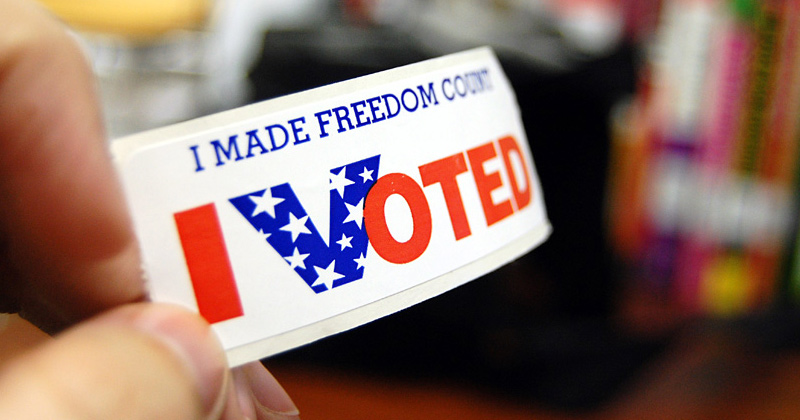 via Flickr
via Flickr “I don’t vote.”
That was Politico senior writer Jake Sherman’s answer to a question I asked during a panel on politics at the Jewish Federations of North America General Assembly about how journalists can maintain objectivity in our hyperpartisan age.
He was joined on stage at the Nov. 12 session in downtown Los Angeles by New York Times’ L.A. bureau chief Adam Nagourney, Los Angeles Times Assistant Managing Editor Christina Bellantoni and conservative commentator and radio host Hugh Hewitt — though none of the others, nor I, copped to taking such a measure for our craft.
Sherman is surely not the only journalist willing to sacrifice a civil right for an ideal, and his ruthless pursuit of fairness and balance in journalism is admirable. But I confess I’m skeptical of what his forfeiture costs.
“So, does that mean you consider yourself a journalist before a citizen?” I asked.
Sherman batted away that question, essentially saying no. But surrendering his most fundamental right as a citizen in order not to appear partisan in his vocation is an alarming solution.
To give up one’s vote is a dereliction of duty.
My knee-jerk reaction to his declaration was mild disturbance. To give up one’s vote — the most essential unit in a democratic system, the axis around which everything else spins — is a dereliction of duty, and takes for granted the principal privilege of living in a free society.
On the other hand, Sherman spends most waking hours of his life contributing to the cause of a free press, upholding one of the essential institutions of democracy. His willingness to guard the integrity of the enterprise is an inspired choice, especially in an age of partisanship and rampant media bias, when almost every major journalistic institution in the country is associated with one political bent or another. “Free press is as fundamental a responsibility as voting,” Sherman told me. “And I can’t do it responsibly while expressing private or public preference for a candidate.”
Can journalists do their jobs if biased towards particular political outcomes? At the very least, should they disclose their bias in the interest of transparency?
The conservative commentator Hewitt said he’d like to see this happen, but I’m not convinced that more partisan declarations would repair what’s broken in our media. Maybe Sherman is on to something.
It’s no secret that hyperpartisanship has paralyzed our politics and produced a brutal political warfare that has resulted in government stasis and inefficiency.
Right now, a majority of Americans view our nation’s government with varying degrees of rage, disillusionment or utter disbelief. According to a recent Gallup report, American confidence in government remains abysmally low, with slightly more than a quarter of Americans (28 percent) saying they’re satisfied with national governance. That number is better than the historic low of 2013, when the government approval rating was 18 percent, but it is well below the 38 percent average since 1971.
“Most U.S. adults are dissatisfied with how the executive and legislative branches are doing their jobs, and majorities hold unfavorable views of both major political parties,” the report stated.
Even Republicans, who control both houses of Congress, disapprove of the way it operates. In fact, “The federal government has the least positive image of any business or industry sector measured; Congress engenders the lowest confidence of any institution that Gallup tests; and Americans rate the honesty and ethics of members of Congress as the lowest among 22 professions in Gallup’s most recent update.”
Under these circumstances, it’s easy to see how a vote might offer validation to a fractured political system — or worse, serve as an exercise in obsolescence. Because when Americans were surveyed about the biggest problems facing our nation, our government came out on top.
Think about it: What bothers Americans most is not North Korean or Iranian nuclear aggression, not China’s growing economy or rampant domestic mass shootings, it’s the unremitting bickering, obstructionism and partisanship that characterizes 21st century American democracy.
During a Shabbat lecture at Sinai Temple in Westwood on Nov. 10, New York Times columnist Bret Stephens suggested that what America needs more than anything is a restoration of citizenship over partisanship. He called for rededication to the values we share as citizens of this nation — not least among them, the beloved right to exercise our moral and political will at the polls.
Not every American citizen is a journalist, but every American journalist is a citizen. It would be a shame to forsake the thing we have in common in order to stand apart. For citizens, voting is an act independent of any result. It is not a partisan exercise but an expression of belonging.
Just do it.






















 More news and opinions than at a Shabbat dinner, right in your inbox.
More news and opinions than at a Shabbat dinner, right in your inbox.